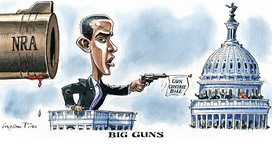(单词翻译:单击)
There is a strong case for companies to stay out of politics. First, their top executives are not, in my experience, startlingly better informed than most interested people. In years of listening to business leaders talk about politics, usually off the record, I have heard few say anything more insightful than you hear at the average dinner party.
有充分理由认为,企业应该远离政治。首先,以我的经验来看,企业高管的政治见解并不比大多数关心政治的人高明太多。多年来,我听企业领袖谈论政治的时候(通常是在非正式场合),很少听到他们中有人能说出比你在一般晚宴上所听到的更为深刻的见解。

An exception was a Danish management consultant who, at the time the euro was created, told me it was like setting household thermostats to the same temperature everywhere from Finland to Greece.
丹麦的一名管理咨询顾问是个例外:他在欧元诞生之际对我说,统一使用欧元,就好像把从芬兰到希腊的暖气全都调成一个温度。
His was a more arresting simile than most European senior executives’. At the time, their favourite was that the EU project was like a bicycle and if you stopped pedalling you would fall off.
他打的这个比方,比欧洲大多数高管打的比方都更有吸引力。后者当时最喜欢打的比方是,欧盟(EU)项目就像一辆自行车,如果你不踩,就会从车上掉下来。
There is an even stronger argument for companies not to take political decisions: their leaders do not represent only themselves.
说企业不应有政治立场还有一个更充分的理由:企业领袖不只代表他们自己。
Whether you believe managers should answer to shareholders or to a broader group of stakeholders – employees, suppliers, the local community – they represent a wide group of people, all of whom have their own political opinions.
无论你认为企业管理者应对股东负责,还是应对更广泛的利益相关群体——员工、供应商、当地社会——负责,总之他们都代表一大群人,这群人中的每个人都有自己的政治见解。
Rather than trying to speak for them, you could argue that companies should allow shareholders and staff to vote for their own opinions and fund the political candidates they support.
你可以主张,企业与其试图代表股东和员工发声,不如让他们去投票表达自己的见解、资助自己支持的政治候选人。
You could, but it would be a waste of time. Companies have always been deeply engaged in politics, from the United Fruit Company’s involvement in the overthrow of the Guatemalan government in 1954 and its backing of the 1961 Cuban Bay of Pigs invasion to legislative lobbying to the everyday funding of candidates for office.
你可以这样主张,但这是在浪费时间。企业一直深深地介入政治:从1954年联合果品公司(United Fruit Company)参与推翻危地马拉政府,到该公司1961年支持入侵古巴猪湾(Bay of Pigs);从游说议会,到向竞选公职的候选人提供日常经费。
Some corporate political activity is clearly meant to help shareholders and employees, even if it is deeply damaging to citizens’ health, such as tobacco companies’ agitating against plain cigarette packaging.
有些企业的政治活动显然是为了增进股东和员工的利益,即便这些活动对民众健康危害巨大,比如烟草企业鼓动反对简单香烟包装(plain cigarette packaging,上面的吸烟有损健康警示信息更鲜明——译者注)。
Even where there is no obvious benefit to the organisation, corporate leaders have justified their political involvement by saying it will help produce a society more hospitable to business. Rupert Murdoch used this argument in 2010 when his company made donations to the Republican Governors Association.
即便有时介入政治不会给企业带来明显的好处,企业领袖也会以可帮助打造对企业更友好的社会为由这么做。2010年,鲁珀特•默多克(Rupert Murdoch)的公司向美国共和党州长联合会(Republican Governors Association)捐款时,就用了这个理由。
So deeply are companies embedded in the political process that it is particularly striking when they refuse to have anything to do with it.
考虑到企业如此深地介入政治进程,当它拒绝与政治扯上任何关系时,就显得格外引人注目。
One example was the US gun control debate. When I contacted American companies last year to ask them where they stood, normally chatty corporate spokesmen were suddenly out of the office and unable to return my calls.
美国枪支管控辩论就是个例子。去年我联系美国的一些企业、询问它们对这个问题持何立场时,那些通常很健谈的企业发言人突然变得全都不在办公室、也无法回复我的电话。
This was true even of those companies whose leaders had bravely backed same-sex marriage on the grounds that gay employees needed to know that their bosses were on their side and potential recruits had to be assured that this was a hospitable place to work. I pointed out to these companies that more US gun attacks happened at workplaces than at any other institution. Wasn’t this a company issue too? The few that got back to me – some with views on everything from fair trade sourcing (in favour) to genetically modified ingredients (against) – said they did not want to talk about guns.
即便是那些勇敢地支持了同性婚姻(他们的理由是:必须让同性恋员工知道,他们的老板站在他们这边;必须让潜在的新员工知道,这是家很友善的公司)的企业领袖,也是如此。我向这些企业指出,在美国,发生在工作场所的枪击事件比发生在任何其他场所的都多。这难道不也是一个跟企业有关的问题吗?极少数回复我电话的企业发言人说,他们不想谈枪的问题。他们中的有些人,其实对一切问题都有自己的看法,从公平贸易采购(持支持态度),到转基因原料(持反对态度)。
The referendum on Scottish independence is another example of corporate reticence. The plebiscite is a hugely consequential event. It could have an impact on the pound, the UK’s world standing and its future in the EU.
苏格兰独立公投是企业变哑巴的另一个例子。此次公投是个后果重大的事件。它可能影响英镑,影响英国的国际地位、以及它在欧盟的前途。
Yet while some British business leaders, such as Sir Richard Branson, have warned of the dangers of a UK break-up, most had to be pushed by 10 Downing Street into saying anything. And when they did, such as the retailers who warned that Scottish prices could go up, they did so late in the campaign and largely in the safety of others saying the same things. Several big companies said nothing.
然而,尽管有些英国企业领袖,比如理查德•布兰森爵士(Sir Richard Branson),曾就英国分裂的危害发出警告,但大多数企业领袖只是在英国政府敦促下才作了一些表态。尽管他们表态了(比如当零售商警告称苏格兰物价可能会上涨),但他们是很晚才这么做的,并且是在别人说过同样的话后才放心表态的。
Why? Some said they did not want to interfere with the Scottish people’s right to decide. The vote has also deeply divided Scotland. These companies’ employees and customers probably reflect that split.
这是为什么?有些企业领袖说,他们不愿干涉苏格兰人民的决定权。公投还让苏格兰内部产生了深刻的分歧,这种分歧在这些企业的员工和顾客中或许同样存在。
But I doubt deep divisions will stop companies from speaking out on Britain’s EU membership if and when that is the subject of a referendum.
但假如公投的主题是英国是否应该脱离欧盟,我不认为深刻的分歧届时能够阻止企业表态。
I think the answer, in the very different arguments over guns and Scotland, is that opponents of gun control and supporters of Scottish independence are formidably well organised and tough on their opponents.
我认为,企业就自己在枪和苏格兰问题上的做法给出反常理由的原因是,反对控枪和支持苏格兰独立的人组织非常严密,并且无情打压异己。
Large companies are powerful. But some groups seem to scare even them.
大企业是强大的。但有些组织似乎连它们都能吓倒。


